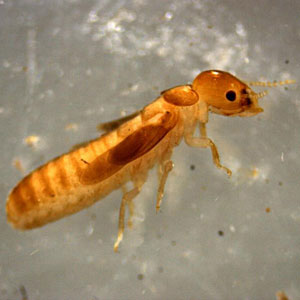 PHILADELPHIA—A routine U.S. Customs and Border Protection (CBP) termite interception in Philadelphia turned into the area’s first recorded interception of Cryptotermes sp (Kalotermitidae), a member of the drywood termite family that occurs in the West Indies.
PHILADELPHIA—A routine U.S. Customs and Border Protection (CBP) termite interception in Philadelphia turned into the area’s first recorded interception of Cryptotermes sp (Kalotermitidae), a member of the drywood termite family that occurs in the West Indies.
CBP agriculture specialists discovered 20 live specimens, suspected of belonging to the infraorder Isoptera, Feb. 10 inside the wood packaging material used to secure a shipment of pineapples from the Dominican Republic. A local U.S. Department of Agriculture (USDA) entomologist identified the species, and also reported the interception as a first-in-port discovery. The national pest interception database verified the first-in-port claim March 3.
While Cryptotermes brevis, commonly known in the Southeastern U.S. as the West Indian drywood termite, is “thought to have been introduced into the continental U.S. at Key West, Fla., before 1919” (source), it is unclear whether the termites found at the port were of this species. UFIFAS notes that another Cryptotermes species, C. cavifrons, “is endemic to and very common in woodlands of peninsular Florida; however, C. cavifrons has a higher moisture requirement and is, as such, seldom a pest of buildings.”
“Intercepting these destructive insect pests at our nation’s borders is of paramount concern to U.S. Customs and Border Protection,” says Susan Stranieri, CBP Port director for the Area Port of Philadelphia. “CBP agriculture specialists are very serious about protecting America’s agriculture industry. They remain vigilant at intercepting invasive insect and plant species at our ports of entry.”
In addition to the termite discovery, CBP agriculture specialists discovered heavily infested wood packaging material (WPM) – wood pallets and bracing – in this shipment. An earlier shipment of Dominican Republic pineapple Feb. 5 also shipped with heavily infested WPM. CBP agriculture specialists captured 43 Isoptera (termite) specimens from that earlier shipment. CBP ordered all WPM re-exported to Dominican Republic.
On a typical day nationally, CBP agriculture specialists inspect almost 1 million travelers to the U.S., and a significant amount of air and sea cargo imported to the United States. They intercept 4,379 prohibited meat, plant materials or animal products, including 440 insect pests.
Leave A Comment